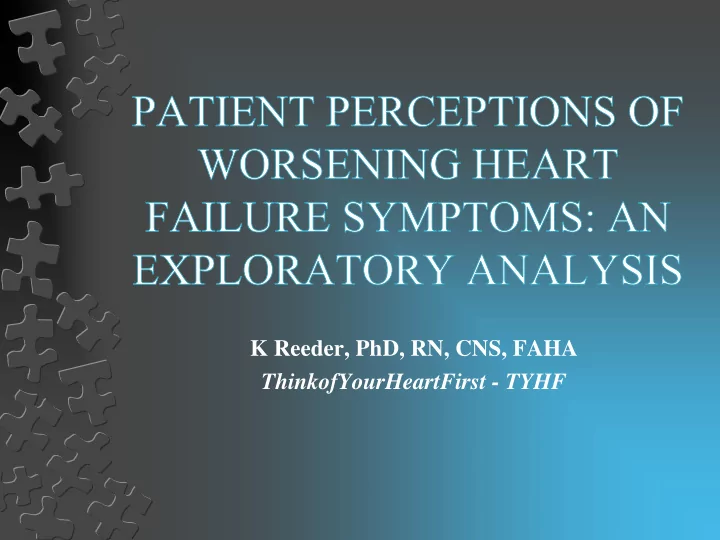

K Reeder, PhD, RN, CNS, FAHA ThinkofYourHeartFirst - TYHF
BACKGROUND ♥ Annually in the U.S.: ~ 1-million HF hospitalizations ~ 6.5-million hospital days > 11-million physician visits > $40-billion ♥ Hospitalizations: Unplanned occur disproportionately ~ 1 in 4 persons are readmitted within 30 days of hospital discharge Independent risk factor for death
Symptom Management Issues ♥ Inconsistent HF self-care research findings ♥ Wide range of symptoms, perceptions & attributions - treatment side effects - co-morbidities - overlapping & unresolved symptoms - aging processes - symptoms wax and wane over time - low somatic awareness - variation in symptom responses
PURPOSE To explore symptom perceptions and self-care behaviors leading up to hospitalization for acute decompensated heart failure.
METHODS ♥ Cross-sectional design ♥ 60 patients hospitalized for acute decompensated heart failure (ADHF) ♥ Large, urban Midwestern university medical center ♥ Semi-structured interviews were conducted using the Day Reconstruction Method (Kahneman et al., 2004) to enhance recall of retrospective symptom experiences.
Interview Questionnaire Domains ♥ Symptoms experienced ♥ Symptom interpretation & attributions ♥ Symptom relief self-care behaviors ♥ Symptom evaluation lay consultations ♥ Symptom reporting to health care providers ♥ Symptom reporting response by health care providers
Demographic summaries of study sample (N=60). Variable n % Variable n % Gender Marital Status Male 33 55.0 Married 29 48.3 Female 27 45.0 Not Married 31 51.7 Age (Years) Children age <18 years (n=59) 20 - 55 18 30.0 Yes 12 20.0 56 - 89 42 70.0 No 47 78.3 Race Employed (n=56) White 33 55.0 Yes 8 13.3 Black 25 41.7 No 48 80.0 Multi-racial 2 3.3 Income Adequacy (n=56) 31 51.7 Hispanic/Latino/Spanish Inadequate Adequate 25 41.7 Yes 4 6.7 No 56 93.3 Health Insurance (n=54) Education (n=59) Private 11 18.3 43 71.7 High School or Less 26 43.3 Public/Other College 33 55.0
Symptoms Experienced ♥ On average, patients experienced 3.77±1.67 (range=0-8) symptoms before hospitalization ♥ Shortness of breath, swelling, fatigue ♥ Symptoms did not significantly vary by -Hospital length of stay -Length of time diagnosed with HF -Previous hospitalization for ADHF
Symptoms experienced prior to HF hospitalization (N=60). Variable† n % Dyspnea 42 70.0 Orthopnea 32 53.3 Fatigue or feeling tired 31 51.7 Paroxysmal nocturnal dyspnea 20 33.3 Swelling of ankles, hands, feet 17 28.3 Feeling anxious 12 20.0 Chest pain or discomfort 12 20.0 Excessive weight gain due to edema 9 15.0 Upset stomach (nausea, vomiting, indigestion) 7 11.7 Feeling bloated 5 8.3 Exercise Intolerance 4 6.7 Loss of appetite (cachexia symptom) 4 6.7 Unusual or unexplained increase in coughing 4 6.7 Having to wake up and use the bathroom at night 4 6.7 Palpitations or feeling irregular heartbeat 3 5.0 Sweating 2 3.3 Dizziness 2 3.3 Weight loss 1 1.7 † Multiple Responses Possible
Symptom Attributions ♥ 37 (61.7%) patients experienced early warning signs of evolving symptoms - Only 6 (10%) patients attributed these to their heart. ♥ 25 (41.7%) patients attributed symptoms to: - Diet: 18.3% - Medications: 13.3% - Weight: 6.7% - Sleep: 5% - Exercise: 3.3% ♥ Patients who had lived with HF under 5 years were less likely to consider changes to medication as a cause of symptoms than those diagnosed more than 5 years ago ( p =.048)
Self-care Strategies for Symptom Relief ♥ 26 (43.3%) patients engaged in self-care strategies to relieve symptoms - Self-medication was most common strategy ♥ Self-medications: Lasix, Nitroglycerin, prescription analgesics, Metformin, Aspirin, Oxygen, and prescription breathing treatments. ♥ Less commonly, raising the head of the bed, resting, walking, and diet changes were attempted to relie ve symptoms.
Symptom Evaluation Lay Consultations ♥ 47 (78.3%) patients said they talked to others about their symptoms before hospitalization ♥ 43 (91.5%) lay consultations were face-to-face as symptoms occurred. ♥ Most often, patients discussed symptoms with spouse/life partner (55.3%) or adult children (23.4%).
Lay Consultant Symptom Attributions ♥ Symptom attributions were given by 24 (51%) lay consultants. ♥ Lay consultants attributed patients’ symptoms to their heart (70.8%), respiratory disorders (37.5%), or diabetes (33.3%).
Lay Consultant Symptom Advice ♥ 39 (83%) lay consultants gave patients advice on what to do for symptoms; - 15 lay consultants gave advice, but did not offer any symptom attributions. ♥ Most often, lay consultants advised patients to seek professional care for symptoms. ♥ 30 (76.9%) patients took the advice given by others, with over 80% of patients seeking care within 1 day. - 20% delayed from 2 to more than 5 days.
Timeliness of Symptom Reporting & Health Care Provider (HCP) Response HCP Contact to ED HCP Contact to Clinic Clinic to ED 1 – 6 hours: 10 Pts. 10 Minutes: 1 Pt. Within 20 Minutes: 1 Pt. 1 – >14 Days: 8 Pts. 2 Hours: 1 Pt. Within 2 Hours: 5 Pts. 1 – 3 Days: 7 Pts. Within 6 Hours: 1 Pt. With ≥ 20 Hours: 2 Pts. 1 Week: 1 Pt. 5 Weeks: 1 Pt.
DISCUSSION ♥ Patients tended to experience typical HF symptoms. ♥ While nearly 2/3 of the patients had early warning signs, few attributed these signals to their heart, and efforts focused on thinking of their heart first are needed. ♥ Patients who had lived with HF longer might have undergone more prescriptive medication changes or self-adjustments.
DISCUSSION ♥ Nearly half of the patients engaged in self- care strategies to relieve symptoms before seeking professional treatment. - Further study needed on self-care strategies used for symptom relief ♥ Most lay consultants advised patients to seek professional care, even in the absence of symptom attributions, stressing the importance of care giver involvement in HF self-care.
Recommend
More recommend